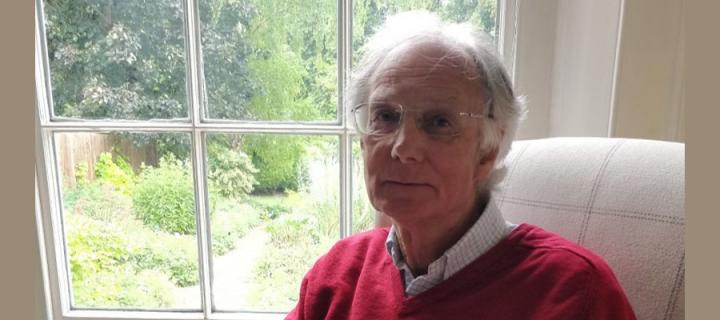Rob Blacklock
Rob Blacklock recalls his experience of studying medicine in the 1960s and shares the path he took to becoming a consultant urological surgeon.
| Name |
Alexander Robert Eadie Blacklock |
| Degree | MBChB |
| Year of Graduation | 1968 |

At the moment
I am a retired consultant urological surgeon. I fully retired from all clinical practice at the age of 65 but continued to be involved with surgical exams – as an examiner and then as an assessor for the Intercollegiate MRCS exams until I became time expired. I am still involved with the Medical School of the University of Warwick in various capacities. I am honorary medical advisor to Kenilworth Rugby Football Club. I am a member of local medical societies and clubs and a trustee of the City of Coventry Male Voice Choir.
Your time at the University
I have Scottish ancestry so was very keen to attend a Scottish university. I have always wanted to be a doctor and had a great uncle who was a graduate of Edinburgh University Medical School so it was the first university to which I applied.
In 1963 applying for Medical School was relatively simple. I submitted an application form with a covering letter from my headmaster and was then sent a provisional acceptance. No interview or other assessment. I achieved the required grades at A level (no grade As required) and going up to Edinburgh found I was to start in the second year of the six-year medical course. The majority of my year, who had taken Scottish Higher Exams, had started in the first year so when I arrived I was very much a new boy. In October 1963 I found myself at the age of 17.5 years cutting up dead bodies while still not legally being allowed to drink alcohol!
In October 1963 I found myself at the age of 17.5 years cutting up dead bodies while still not legally being allowed to drink alcohol!
I settled in to student life quickly. I initially stayed in student digs but later moved into a flat with friends. The medical curriculum in those days was broadly split in to pre-clinical studies (basic medical sciences) for the first three years and then having passed the requisite exams, clinical studies with exposure to patients for the last three years. The pre-clinical studies were based in the Medical School in Teviot Place which was adjacent to the Men’s Union which became the social hub for myself and friends. The Men’s Union hosted debates, meetings, beer drinking competitions, Saturday night dances, balls, etc and the bar in the basement on a Saturday night was the place to be to find out the addresses of parties for later in the evening! I particularly remember the annual Charity Week with border raids, ball and floats procession along Princes Street on the final Saturday afternoon. I also remember the torchlight processions to Carlton Hill.
The Royal Dick Vet held dances on a Saturday night and it was at one of these that I met a History student who subsequently became my wife after we had both graduated.
Your experiences since leaving the University
Before graduating in 1968 a friend in the year had suggested going abroad to do our houseman year. He found out about various places including Barbados. I applied to the Queen Elizabeth Hospital in Barbados and was accepted. (My friend married instead so stayed in the UK.)
After an amazing year in the West Indies I had decided on a career in surgery so on returning to the UK, after first getting married, I set about doing this. After a spell as a GP in my home town I became a junior anaethetist in York for 15 months while studying for my primary surgical exams. I then moved back to Edinburgh and after senior house officer posts became a surgical registrar on the three-year surgical training rotation. During this time I passed the final surgical exams and became a Fellow of the Royal College of Surgeons of Edinburgh. We then left Edinburgh to move down to Birmingham so that I could take up a senior registrar post in urology. I was subsequently appointed as a consultant urological surgeon to the Coventry hospitals based in the new Walsgrave Hospital, which in time became the Teaching Hospital for the new Medical School of Warwick University (University Hospital of Coventry and Warwickshire).
Your Covid-19 experience
At the beginning of the lockdown I received an email from the General Medical Council to inform me that my name had been re-instated on the Medical Register and that I was now good to go to fight the coronavirus! I was surprised as I thought that only doctors who had retired in the last five years were being recalled. However I was happy to help and after an initial telephone conversation with someone from Capita (to whom recruitment had been outsourced) I completed forms online and submitted these with a photograph of myself holding my passport open at the photograph page. Heard nothing, then was asked to submit all the information again for a Disclosure and Barring Service (DBS) check into any possible criminal background. Finally, before the end of April, I was informed that all hurdles had been cleared but since then I have not been contacted as the NHS has fortunately been able to cope with managing the Covid-19 pandemic.
Alumni wisdom
Edinburgh is a tremendous place to live and study and in my top best three cities in the world. While it is very important to take advantage of the world-class university teaching to achieve academic success it is also important to use the time at the University to meet, socialise and interact with students and staff from different faculties and cultures.

